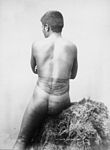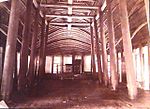Thomas Andrew (photographer)
Thomas Andrew | |
|---|---|
 Thomas Andrew, c. 1919 | |
| Born | 19 January 1855 |
| Died | 7 August 1939 (aged 84) |
| Nationality | New Zealander |
| Known for | Photography |
Thomas Andrew (19 January 1855 – 7 August 1939) was a New Zealand photographer who lived in Samoa from 1891 until his death in 1939.
Andrew took photographs that are of significant historical and cultural value including the recording on camera of key events in Samoa's colonial era such as the Mau movement, the volcanic eruption of Mt Matavanu (1905–1911) and the funeral of writer Robert Louis Stevenson.
Many of his surviving images are held in the collections of the Museum of New Zealand Te Papa Tongarewa and include landscapes and studio portraits of Samoans[1] that went beyond the colonial stereotypes of the time.[2]
Andrew was born in Takapuna, a suburb in Auckland on the North Island of New Zealand. He worked as a photographer in Napier. He later opened a studio in Auckland which was destroyed by fire.[3] In 1891, he went to Samoa where he worked with two other New Zealand photographers, Alfred James Tattersall and John Davis.[2] He died in Apia, the capital of Samoa.[1]
Gallery
[edit]- Historical photographs by Thomas Andrew
-
Young man dressed as a manaia, son of a Samoan matai, taken 1890-1910
-
Burial and grave of Robert Louis Stevenson on Mount Vaea, Samoa, 1894
-
Exiled Samoan leader Lauaki Namulauulu Mamoe (died 1915)
-
Two men in a canoe (paopao, va'a) fishing in Samoa, c. 1914
-
Samoan male with traditional tattoo (pe'a), taken 1890s
-
Samoan traditional tattooist (tufuga ta tatau), c 1895
-
Interior of church building in Niue, 1896.
-
Two leaf-clad women, 1905.
References
[edit]- ^ a b "Thomas Andrew". Museum of New Zealand Te Papa Tongarewa. Retrieved 13 February 2009.
- ^ a b Maxwell, Anne (2000). Colonial Photography and Exhibitions: Representations of the Native and the Making of European Identities. Continuum International Publishing Group. p. 166. ISBN 0-7185-0229-9. Retrieved 13 February 2010.
- ^ "ATL: Unpublished Collections". tiaki.natlib.govt.nz. Retrieved 2 June 2019.
External links
[edit]- Works by Thomas Andrew in the collection of Auckland War Memorial Museum
- Works by Thomas Andrew in the collection of the Museum of New Zealand Te Papa Tongarewa









